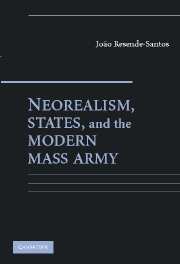Book contents
- Frontmatter
- Contents
- List of Tables and Figures
- Acknowledgments
- 1 Military Emulation in the International System
- 2 Theory of Military Emulation
- 3 Arms and States in Nineteenth-Century South America
- 4 Military Emulation in Chile, 1885–1914
- 5 Military Emulation in Argentina, 1895–1930
- 6 Military Emulation in Brazil, 1870–1930
- 7 Conclusion
- Index
7 - Conclusion
Published online by Cambridge University Press: 23 November 2009
- Frontmatter
- Contents
- List of Tables and Figures
- Acknowledgments
- 1 Military Emulation in the International System
- 2 Theory of Military Emulation
- 3 Arms and States in Nineteenth-Century South America
- 4 Military Emulation in Chile, 1885–1914
- 5 Military Emulation in Argentina, 1895–1930
- 6 Military Emulation in Brazil, 1870–1930
- 7 Conclusion
- Index
Summary
Military emulation is an enduring phenomenon in the international system. Its causes are to be found, not in the character and internal conditions of states or in their shared cultural norms, but in the nature of the international system they occupy. This study developed a neorealist theory of emulation to explain crossnational emulation and its variance. The essence of this work has involved uncovering and developing a hidden and neglected dimension of neorealism. The work builds on the foundations laid by Waltz. It corrects many of the flaws in Waltzian neorealism while remaining faithful to its structural logic and economy of explanation.
The theory directs our attention to how adverse shifts in the state's external security prompt it to undertake large-scale internal balancing efforts such as military emulation. The study shows that military emulation is a form of balancing behavior, specifically internal balancing. It is thus a product of the security competition inherent to anarchic systems. Unlike explanations that focus on unique attributes of individual states or global cultural norms, the neorealist theory of emulation offers a clean, testable, and economical account of why a variety of states emulate the same military system. Equally as important, and unlike social theory accounts, the theory explains the variance in their emulation process – its timing, pace, and scale. Whether states emulate, whom they emulate, when, how much, and how often are dictated by their external security environment – not historical peculiarities, domestic concerns, ideological whims, or cultural predilections.
- Type
- Chapter
- Information
- Neorealism, States, and the Modern Mass Army , pp. 296 - 316Publisher: Cambridge University PressPrint publication year: 2007



